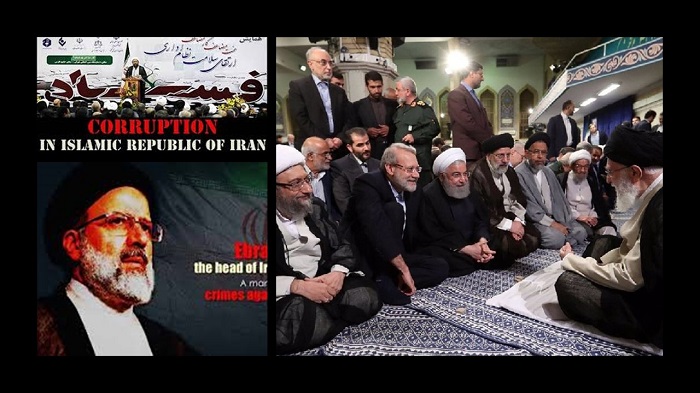

Corruption among the leadership in Iran is widespread. It is found at all levels of leadership and it would be impossible to eliminate corruption because it has become so engrained in the regime’s existence.
The former judiciary chief Sadegh Amoli Larijani, while he was in office, reportedly earned in excess of $66.5 million from illegal accounts (even by the regime’s standards). When this information was disclosed, many hoped that the authorities would address the larger problems that extend much further beyond one single official.
“The Systematic Corruption in Iran’s Judiciary”
By Pooya Stone @Iran_FocusAfter disclosure of 63 bank accounts of the former judiciary chief Sadegh Amoli Larijani, Iranian citizens expected authorities to put an end to the systematic corruption in…https://t.co/sdLGyvMrf8
— Iran Focus (@Iran_Focus) June 15, 2020
When Ebrahim Raisi took over Larijani’s position as the chief of the judiciary, many expected him to look into further suspicious accounts. Larijani got away with his millions and the authorities made it clear that the regime’s own laws mean nothing. However, this never happened. In fact, all that became clear was the fact that these suspicious accounts are just one minor issue in a huge problem.
In 1994, the head of the judiciary Mohammad Yazdi called on the Supreme Leader to allow the opening of personal accounts, saying that the profits would be used to pay for judiciary costs. The request was granted. The secrecy surrounding these accounts means very few details are known. But this secrecy also proves that they are highly unethical. And it also proves that judiciary officials do not have to answer to anyone. Supreme Leader Ali Khamenei has allowed officials to circumvent the law.
When Larijani’s accounts were disclosed, Mahmoud Sadeghi, a former member of Majlis (the regime’s Parliament) revealed that Larijani had spent some of the money from these accounts on housing. Huge sums were also spent on judges.
Struan Stevenson- Corrupt #Iranian Runaway Judge Exposes Deep Fractures in Iranian Regime
Corruption has been institutionalized within the Iranian regime, particularly in its governing bodies, from the outset. #Iranhttps://t.co/U6kZYablO2— NCRI-FAC (@iran_policy) June 16, 2020
The authorities have remained largely silent about the case because of the exposure it brings to the regime’s widespread corruption.
Larijani, on the other hand, has shirked responsibility, saying that the accounts are not private and that they were opened by his predecessors.
The accounts in question – 63 in total – have been reduced down to only five, according to Raisi. Whether this is the case or not is unknown, but no matter how many accounts exist, or existed, the total worth is dozens of millions.
The volatile relationship between Raisi and Larijani has not brought any clarity to the situation which has just resulted in much infighting.
The people know that corruption is rife in the country. The people are, as always, the first victims of the regime’s mismanagement and corrupt practices. They are the ones that lose out because the regime is making itself richer while more and more Iranians fall into absolute poverty.
This is one of the reasons why the people of Iran are determined to see the regime collapse. Every day they are dealing with the consequences of the regime’s criminality and corruption. In the context of the current coronavirus health crisis, many nurses and doctors have paid the price for the regime’s greed. The country was adequately equipped to deal with the health crisis, but at the start of the outbreak, officials stockpiled personal protective equipment and sold it to foreign countries for a profit.
The National Council of Resistance of Iran (NCRI) and People’s Mojahedin Organization of Iran (PMOI / MEK Iran) is the main opposition to the Mullahs regime. It is a major threat to the regime’s existence and the (PMOI / MEK Iran) has been instrumental in drawing the world’s attention to the regime’s crimes and corruption. The (PMOI / MEK Iran) has been encouraging the people of Iran to participate in protests and anti-government demonstrations in a bid to overthrow the regime that only has malign interests.







